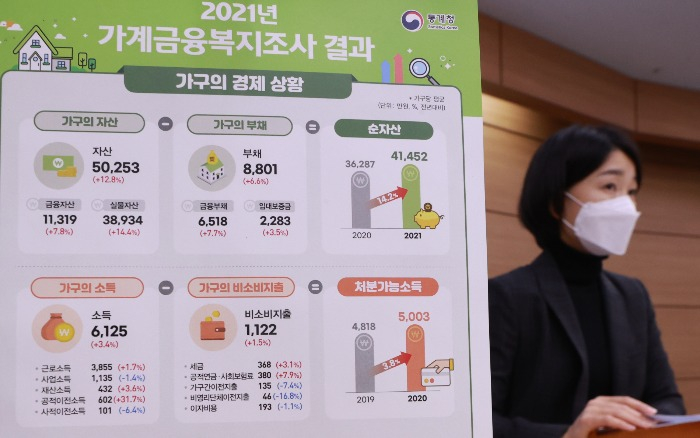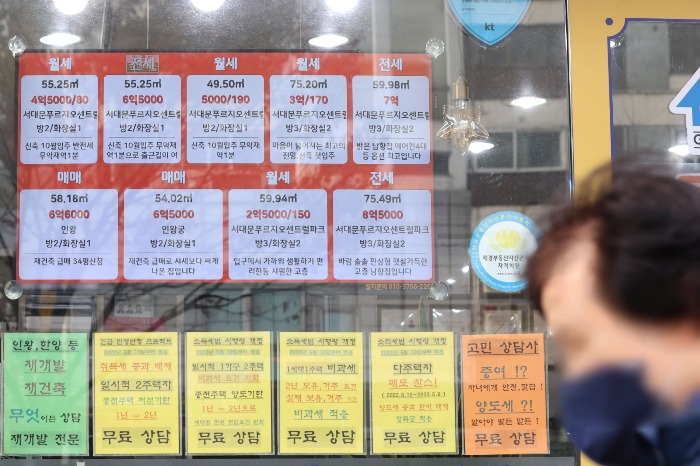Economy
Average household debt in South Korea exceeds $69,000 so far this year
Statistics Korea, under the Ministry of Economy and Finance, announced that household debt jumped 4.2% jump on-year
By Dec 01, 2022 (Gmt+09:00)
2
Min read
Most Read
MBK’s Korea Zinc takeover attempt to spur search for white knights


Korea Zinc, MBK face proxy war for zinc smelter


Korea Zinc shares skyrocket after buybacks in tender offer


Lotte to liquidate rubber JV in Malaysia, sell overseas assets for $1 bn


Samsung to unveil 400-layer bonding vertical NAND for AI servers by 2026



The average household debt in South Korea has exceeded 90 million won ($69,284). While the figure appears to be high by Korean standards, average household debt in the United States stands currently stands at $96,371.
Statistics Korea, under the Ministry of Economy and Finance, announced Thursday that the household debt as of late March reached 91.7 million won, a 4.2% jump from the same month last year.
It is the first time household debt has exceeded the 90 million won mark since the Korean government began compiling the numbers in 2012.
Household debt typically includes home mortgages, home equity loans, auto loans, student loans, and credit cards.
By age group, those aged under 29 accumulated 50.1 million won in household debt, a 41.2% surge on-year. Of that number, financial liabilities increased by 35.4% to 45.8 million won.
The survey is conducted on paid labor force over the age of 15.
Household debt for those in their 50s and 60s rose by 6.8% and 6% respectively.
Koreans in their 30s and 40s saw the lowest rate of increase in their household debts, which hovers around just 1%.
“We found that those under the age of 29 have proactively applied for and received mortgages this year, resulting in the rapid increase in the amount of debt for people in their 20s,” Lim Kyung-eun, Director of the Welfare Statistics Division at Statistics Korea said.
In other words, more twenty-somethings than before applied for mortgage loans late last year and early this year when housing prices started to skyrocket. Experts say the Gen-Z population appears to have bet on continued price hikes in the domestic housing market.

The asset disparity grew larger.
The number of households with more than 10 billion won in net assets increased from 9.4% of the total household in 2021 to 11.4% this year. But the number of households that have more debt than assets also climbed from 7.8% of the households to 9% of the total this year.
Anxiety about retirement remained.
Only 8.7% of the surveyed families where the head of the household has yet to retire answered they are prepared for his or her retirement.
More than half of the respondents said their households are not prepared for the main breadwinner's retirement.
Write to Jung-hwan Hwang at jung@hankyung.com
Jee Abbey Lee edited this article.
More to Read
-
 Upcoming IPOsCuckoo eyes $172 mn IPO of Malaysian unit in Kuala Lumpur: Bloomberg
Upcoming IPOsCuckoo eyes $172 mn IPO of Malaysian unit in Kuala Lumpur: BloombergOct 30, 2024 (Gmt+09:00)
-

-

-

-
 RegulationsHeavy inheritance, gift taxes spur rich Koreans to emigrate to Singapore
RegulationsHeavy inheritance, gift taxes spur rich Koreans to emigrate to SingaporeOct 22, 2024 (Gmt+09:00)
Comment 0
LOG IN


